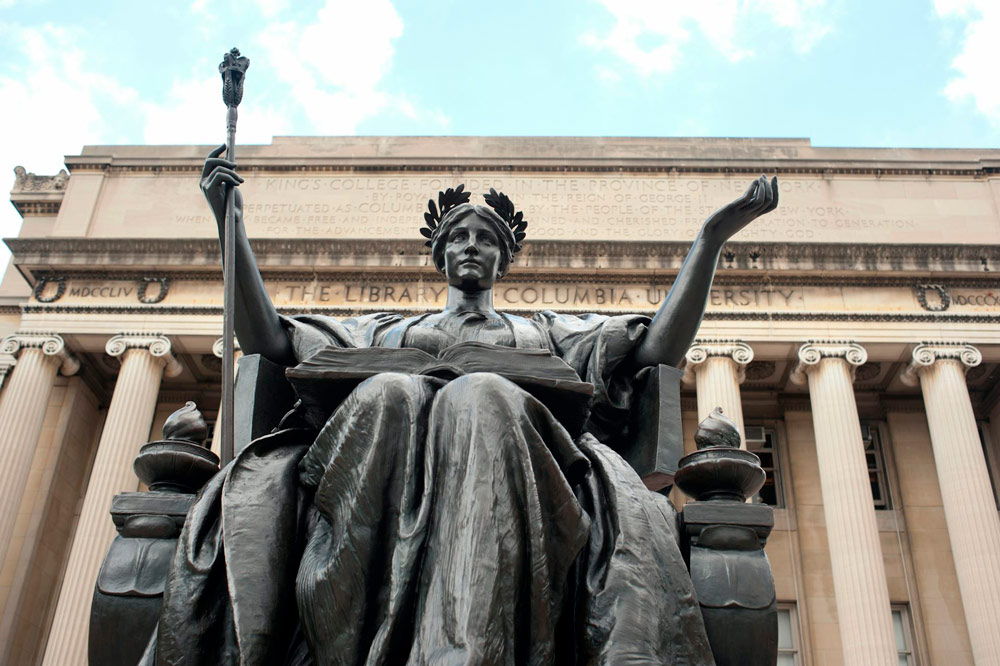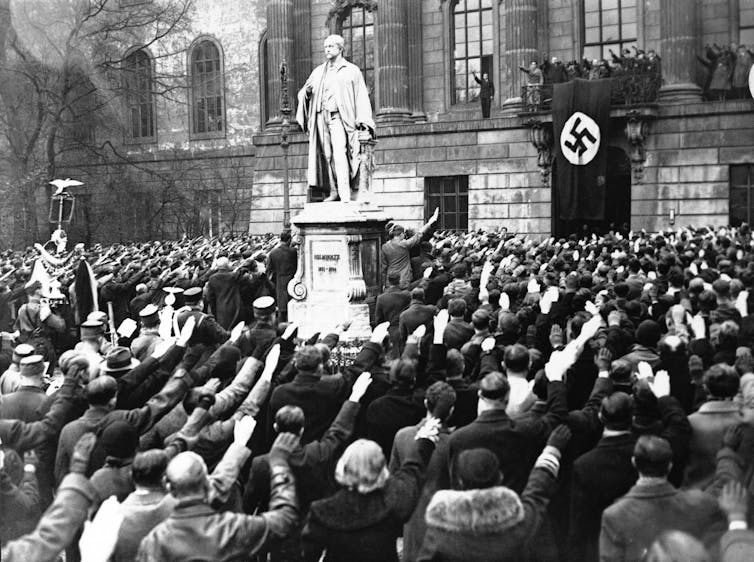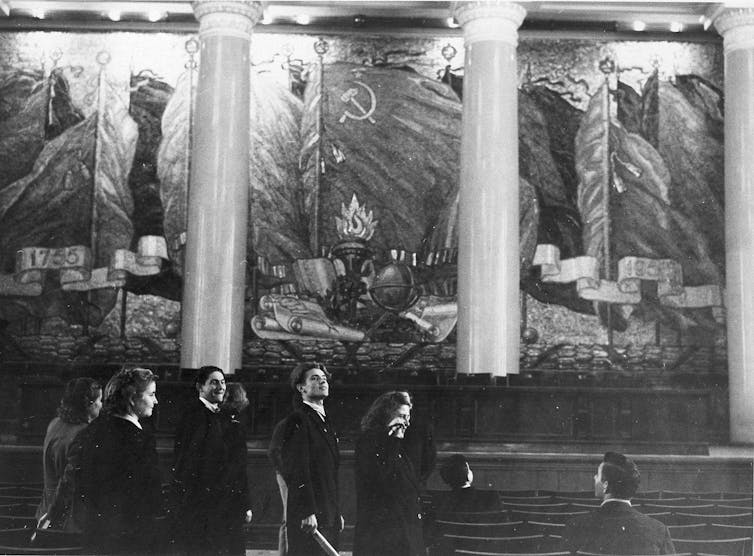
By Iveta Silova
Many American universities, widely seen globally as beacons of academic integrity and free speech, are giving in to demands from the Trump administration, which has been targeting academia since it took office.
In one of his first acts, President Donald Trump branded diversity, equity and inclusion programs as discriminatory. His administration also launched federal investigations into more than 50 universities, from smaller regional schools such as Grand Valley State University in Michigan and the New England College of Optometry in Massachusetts to elite private universities such as Harvard and Yale.
Trump ramped up the pressure by threatening university research funding and targeting specific schools. In one example, the Trump administration revoked US$400 million in grants to Columbia University over its alleged failures to curb antisemitic harassment on campus. The school later agreed to most of Trump’s demands, from tightening student protest policies to placing an entire academic department under administrative oversight – though the funding remains frozen.
Cornell, Northwestern, Princeton, Brown and the University of Pennsylvania have also recently had grants frozen. Harvard was sent a list of demands in order to keep $9 billion in federal funding.
Now, across the United States, many universities are trying to avoid being Trump’s next target. Administrators are dismantling DEI initiatives – closing and rebranding offices, eliminating positions, revising training programs and sanitizing diversity statements – while professors are preemptively self-censoring.
Not all institutions are complying. Some schools, such as Wesleyan, have refused to abandon their diversity principles. And organizations including the American Association of University Professors have filed lawsuits challenging Trump’s executive orders, arguing they violate academic freedom and the First Amendment.
But these remain exceptions, as the broader trend leans toward institutional caution and retreat.
As a scholar of comparative and international education, I study how academic institutions respond to authoritarian pressure – across political systems, cultural contexts and historical moments. While some universities may believe that compliance with the administration will protect their funding and independence, a few historical parallels suggest otherwise.

AP Photo
German universities: A lesson
In the 1975 book “The Abuse of Learning: The Failure of German Universities,” historian Frederic Lilge chronicles how German universities, which entered the 20th century in a golden age of global intellectual influence, did not resist the Nazi regime but instead adapted to it.
Even before seizing national power in 1933, the Nazi Party was closely monitoring German universities through nationalist student groups and sympathetic faculty, flagging professors deemed politically unreliable – particularly Jews, Marxists, liberals and pacifists.
After Hitler took office in 1933, his regime moved swiftly to purge academic institutions of Jews and political opponents. The 1933 Law for the Restoration of the Professional Civil Service mandated the firing of Jewish and other “non-Aryan” professors and members of the faculty deemed politically suspect.
Soon after, professors were required to swear loyalty to Hitler, curricula were overhauled to emphasize “national defense” and “racial science” – a pseudoscientific framework used to justify antisemitism and Aryan supremacy – and entire departments were restructured to serve Nazi ideology.
Some institutions, such as the Technische Hochschule Stuttgart, even rushed to honor Hitler with an honorary doctorate within weeks of his rise to power. He declined the offer, though the gesture signaled the university’s eagerness to align with the regime. Professional associations, such as the Association of German Universities, stayed silent, ignoring key opportunities to resist before universities lost their autonomy and became subservient to the Nazi state.
As linguist Max Weinreich wrote in his 1999 book “Hitler’s Professors,” many academics didn’t just comply, they enabled the regime by reshaping their research. This legitimized state doctrine, helping build the intellectual framework of the regime.
A few academics resisted and were dismissed, exiled or executed. Most did not.
The transformation of German academia was not a slow drift but a swift and systemic overhaul. But what made Hitler’s orders stick was the eagerness of many academic leaders to comply, justify and normalize the new order. Each decision – each erased name, each revised syllabus, each closed program and department – was framed as necessary, even patriotic. Within a few years, German universities no longer served knowledge – they served power.
It would take more than a decade after the war, through denazification, reinvestment and international reintegration, for West German universities to begin regaining their intellectual standing and academic credibility.

AP Photo/Zander Hollander
USSR and fascist Italy suffer similar fate
Other countries that have fallen under authoritarian regimes followed similar trajectories.
In fascist Italy, the shift began not with violence but with a signature. In 1931, the Mussolini regime required all university professors to swear an oath of loyalty to the state. Out of more than 1,200, only 12 refused.
Many justified their compliance by insisting the oath had no bearing on their teaching or research. But by publicly affirming loyalty and offering no organized resistance, the academic community signaled its willingness to accommodate the regime. This lack of opposition allowed the fascist government to tighten control over universities and use them to advance its ideological agenda.
In the Soviet Union, this control was not limited to symbolic gestures – it reshaped the entire academic system.
After the Russian Revolution in 1917, the Bolsheviks oscillated between wanting to abolish universities as “feudal relics” and repurposing them to serve a socialist state, as historians John Connelly and Michael Grüttner explain in their book “Universities Under Dictatorship.” Ultimately, they chose the latter, remaking universities as instruments of ideological education and technical training, tightly aligned with Marxist-Leninist goals.
Under Josef Stalin, academic survival depended less on scholarly merit than on conformity to official doctrine. Dissenting scholars were purged or exiled, history was rewritten to glorify the Communist Party, and entire disciplines such as genetics were reshaped to fit political orthodoxy.
This model was exported across Eastern and Central Europe during the Cold War. In East Germany, Czechoslovakia and Poland, ministries dictated curricula, Marxism-Leninism became mandatory across disciplines, and admissions were reengineered to favor students from loyalist backgrounds. In some contexts, adherents to older intellectual traditions pushed back, especially in Poland, where resistance slowed though could not prevent the imposition of ideological control.
By the early 1950s, universities across the region had become what Connelly calls “captive institutions,” stripped of independence and recast to serve the state.
A more recent example is Turkey, where, following the failed 2016 coup, more than 6,000 academics were dismissed, universities were shuttered and research deemed “subversive” was banned.
History’s warning
The Trump administration’s early and direct intervention into higher education governance echoes historical attempts to bring universities under state influence or control.
The administration says it is doing so to eradicate “discriminatory” DEI policies and fight what it sees as antisemitism on college campuses. But by withholding federal funding, the administration is also trying to force universities into ideological conformity – by dictating whose knowledge counts but also whose presence and perspectives are permissible on campus.
Columbia’s reaction to Trump’s demands sent a clear message: Resistance is risky, but compliance may be rewarded – though the $400 million has yet to be restored. The speed and scope of its concessions set a precedent, signaling to other universities that avoiding political fallout now may mean rewriting policies, reshaping departments and retreating from controversy, perhaps before anyone even asks.
The Trump administration has already moved on to other universities, including the University of Pennsylvania over its transgender policies, Princeton for its climate programs and Harvard over alleged antisemitism. The question is which school is next.
The Department of Education has launched investigations into over 50 institutions, accusing them of using “racial preferences and stereotypes in education programs and activities.” How these institutions choose to respond may determine whether higher education remains a space for open inquiry.
The pressure to conform is not just financial – it is also cultural. Faculty at some institutions are being advised not to use “DEI” in emails and public communication, with warnings to not be a target. Academics are removing pronouns from their email signatures and asking their students to comply, too. I’ve been on the receiving end of those warnings, and so have my counterparts at other institutions. And students on visas are being warned not to travel outside the U.S. after several were deported or denied reentry due to alleged involvement in protests.
Meanwhile, people inside and outside academia are combing websites, syllabi, presentations and public writing in search of what they consider ideological infractions. This type of peer surveillance can reward silence, incentivize erasure and turn institutions against their own.
When universities start regulating not just what they say but what they teach, support and stand for – driven by fear rather than principle – they are no longer just reacting to political threats, they are internalizing them. And as history has shown, that may mark the beginning of the end of their academic independence.
![]()
Iveta Silova is Professor of Comparative and International Education at Arizona State University.






























Marek says
This is an excellent article. Future of the education is seriously endangered.
Deborah Coffey says
Kennan says
Colleges have always been a spawning ground for not just free thought, but freedom of expression.
This sacred right along with the glaring almost” unspoken” debate about whose First Amendment rights really matter is troubling.
Let me be Frank. The catalyst and push against students rights…..Human rights more honestly, has been clearly framed against student protesters across the nation.
What should be understood? Is that protesters in support of Palestine have been punished at multiple levels. They have been called Hamas protesters, which conflicts Hamas and Palestinians and/or Gazans as terrorists. A dangerous lie, and quite obviously propaganda to frame Israel as the victim in the face of a genocide, they have perpetrated continually for the last 18 months and counting.. They are always a few bad players in a protest, no doubt, but if you’re paying attention, the vast majority of violence is coming from counter protesters in support of Israel. A demonstration against Israel’s war in Gaza at UCLA turned violent when vigilante pro Israel mobs attacked a solidarity encampment occupied by peaceful pro Palestinian protesters. Witnesses said LAPD only intervened after nearly 4 hours of tax on pro Palestinian in amps. Masked pro Israel counter demonstrators shot fireworks into encampments, assaulted students with pepper spray, sticks, and stones. Before the police arrived, a group reportedly piled on one person who lay on the ground, kicking and beating him until others pulled him out of the fray.
This among similar events across the nation or live streamed and videoed for all to see.
Listen, I realize this article is about government demands on universities and their rights to free speech, but Gaza is the overwhelming spark to an overreaching plethora of defunding and threats against universities.
The blunt reality is that this isn’t about antisemitism at all. This is about the countries’s massive shift and support for Palestine.: not just on college campuses, but the world at large.
There is no question that antisemitism exists, and like so many other forms of racism it always will.
The framework of the anti-Semitism narrative is there to combat the ground swell of support for Palestine or Gaza as we know it today. The antisemitic narrative is pushed spuriously to divert attention away from the obvious. A genocide that has been unilaterally recognized by criminal courts, the international criminal court in particular, and most importantly, the court of public opinion worldwide
Protesting used to be the most American form of acting on our first amendment rights. Away for young people do not just be educated and aware, but to become part of a solution for the world’s perceived slides, and in many cases, it’s injustice.
It seems to me that with all the governmental threats and defending the government is engaged in, we need the first amendment more than ever.